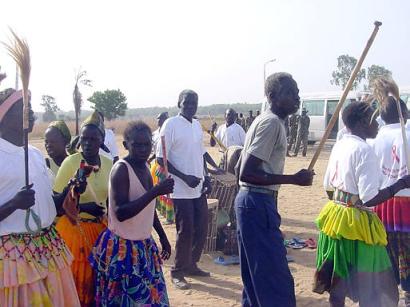Southern Sudanese town enjoying the quiet, now hoping for peace

By MOHAMED OSMAN Associated Press Writer
JUBA, Sudan, Feb 20, 2004 (AP) — New buildings are going up in this southern city. Phone lines are being laid and an Internet cafe has opened. At Peace Square, where homeless war widows once slept on the dirt hugging their children, young couples chat into the evening at a new restaurant.
Juba, a city that was reduced by war to being a place of the old, the hungry and the abandoned, has started coming back to life in the year since the Sudanese government and rebels signed a truce, setting the stage for peace talks now under way in neighboring Kenya.
“Only two years ago, we did not have a single commuter minibus in this town. Now, as you can see for yourself, we have scores of them taking people from any end of downtown Juba,” said Adou Kelefa, a 35-year-old mechanic and minibus driver.
“I believe this town will be something different with the coming of peace. We could even have better vans going around – instead of this junk of steel and smoke,” Kelefa said.
Peace after a 21-year north-south civil war that has killed and uprooted millions, would be a triumph for the U.S., European and African diplomats coaxing the continent’s biggest country toward normality.
Things could still come unstuck. The two sides have to reach agreement on sharing the country’s oil wealth, and another, separate rebellion is raging in the west of Sudan. Eastern Sudan also has a history of tribal unrest.
But as he struggles to steer his dilapidated Toyota van over the rough roads of Juba’s poorest neighborhoods, Keleka’s optimism doesn’t waver.
He boasts of having stayed in Juba even during the worst fighting rather than join the refugee exodus. Once those refugees return, Juba’s population is expected to grow from 350,000 to a million.
At the Khustum bus station, women sell snacks and tea. In the evenings, young men, including former fighters and others back from the relative sanctuary of the north, joke with the waitresses, eating and drinking outside the mud canteens.
Hanging out here used to be an invitation to harassment by government forces on the lookout for young rebel fighters.
Another big change is the underground telephone lines that will bring service into all city homes. Mobile phone service is available, in a place where even carrying an unauthorized two-way radio was a serious security offense just two years ago.
The Sudanese government is refurbishing the University of Juba, transformed during the war into a camp for government-allied paramilitaries.
Prices of goods from the north are double what is paid in the capital, Khartoum. But at least there’s food. In the past, war prevented crops from being planted and famine reigned.
A dozen perfect mangos cost 3,000 pounds ($1.20) – a fifth of the wartime price. But a soft drink, which has to be flown in from Khartoum, costs 80 cents – twice the price in the capital. An experienced Sudanese civil servant earns 270,000 pounds (about $100) a month.
For worse is the legacy of 2 million dead, most through war-induced famine. Juba’s children, in particular, still show high rates of malnutrition, anemia, malaria and emotional damage from the loss of parents and the fighting they have witnessed.
Kindergarten teacher Angelo Jinawe says that when given clay to mold, most of the kids in his care make tanks or war planes.
UNICEF, the U.N. children’s fund, has trained 85 teachers in Juba in methods of overcoming these traumas.
“We hope that through playing we can help these children learn something positive and, in the end, heal their psychological wounds,” Jinawe said. “But peace would be the greatest of boosts – I honestly believe so.”
He said he was amazed at how well the children respond to one particular song in the local Achule language – clapping, cheering and dancing excitedly when he leads the chorus.
“‘Together we go around, in peace we go around,”‘ the 41-year-old teacher sang, then added: “We also hope.”
